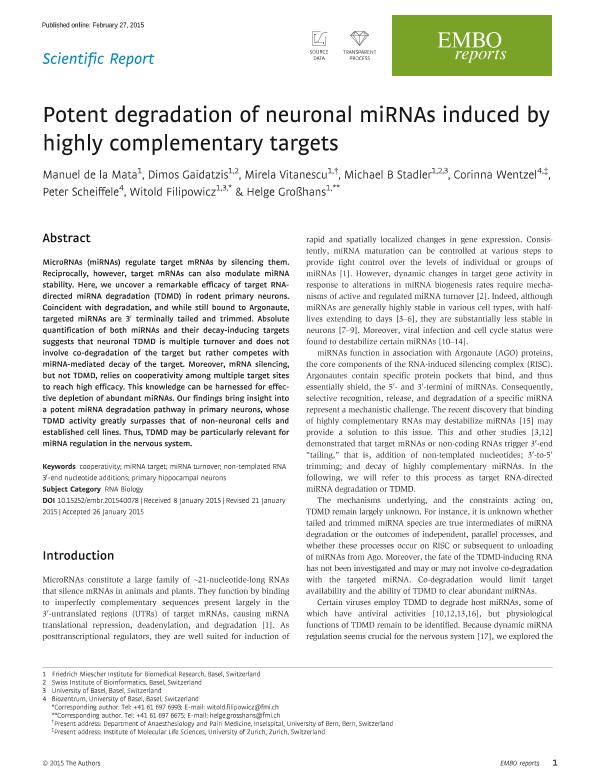Artículo
Potent degradation of neuronal miRNAs induced by highly complementary targets
de la Mata, Manuel ; Gaidatzis, Dimos; Vitanescu, Mirela; Stadler, Michael B.; Wentzel, Corinna; Scheiffele, Peter; Filipowicz, Witold; Großhans, Helge
; Gaidatzis, Dimos; Vitanescu, Mirela; Stadler, Michael B.; Wentzel, Corinna; Scheiffele, Peter; Filipowicz, Witold; Großhans, Helge
 ; Gaidatzis, Dimos; Vitanescu, Mirela; Stadler, Michael B.; Wentzel, Corinna; Scheiffele, Peter; Filipowicz, Witold; Großhans, Helge
; Gaidatzis, Dimos; Vitanescu, Mirela; Stadler, Michael B.; Wentzel, Corinna; Scheiffele, Peter; Filipowicz, Witold; Großhans, Helge
Fecha de publicación:
04/2015
Editorial:
Nature Publishing Group
Revista:
Embo Reports
ISSN:
1469-221X
Idioma:
Inglés
Tipo de recurso:
Artículo publicado
Clasificación temática:
Resumen
MicroRNAs (miRNAs) regulate target mRNAs by silencing them. Reciprocally, however, target mRNAs can also modulate miRNA stability. Here, we uncover a remarkable efficacy of target RNA-directed miRNA degradation (TDMD) in rodent primary neurons. Coincident with degradation, and while still bound to Argonaute, targeted miRNAs are 3′ terminally tailed and trimmed. Absolute quantification of both miRNAs and their decay-inducing targets suggests that neuronal TDMD is multiple turnover and does not involve co-degradation of the target but rather competes with miRNA-mediated decay of the target. Moreover, mRNA silencing, but not TDMD, relies on cooperativity among multiple target sites to reach high efficacy. This knowledge can be harnessed for effective depletion of abundant miRNAs. Our findings bring insight into a potent miRNA degradation pathway in primary neurons, whose TDMD activity greatly surpasses that of non-neuronal cells and established cell lines. Thus, TDMD may be particularly relevant for miRNA regulation in the nervous system. Synopsis This quantitative study of target-directed miRNA degradation (TDMD) reveals its potency in primary neurons and distinguishes TDMD and mRNA degradation as independent processes, the balance of which can be tilted toward depletion of even abundant miRNAs by appropriate target design. Target-induced non-templated nucleotide addition (tailing) occurs on miRNAs, while they are bound to Argonaute. TDMD and mRNA silencing are independent processes, permitting one target to induce degradation of several miRNA molecules. mRNA silencing, but not TDMD, requires cooperativity among multiple target sites to reach high efficiency. This quantitative study of target-directed miRNA degradation (TDMD) reveals its potency in primary neurons and distinguishes TDMD and mRNA degradation as independent processes, the balance of which can be tilted toward depletion of even abundant miRNAs by appropriate target design.
Archivos asociados
Licencia
Identificadores
Colecciones
Articulos(IFIBYNE)
Articulos de INST.DE FISIOL., BIOL.MOLECULAR Y NEUROCIENCIAS
Articulos de INST.DE FISIOL., BIOL.MOLECULAR Y NEUROCIENCIAS
Citación
de la Mata, Manuel; Gaidatzis, Dimos; Vitanescu, Mirela; Stadler, Michael B.; Wentzel, Corinna; et al.; Potent degradation of neuronal miRNAs induced by highly complementary targets; Nature Publishing Group; Embo Reports; 16; 4; 4-2015; 500-511
Compartir
Altmétricas



